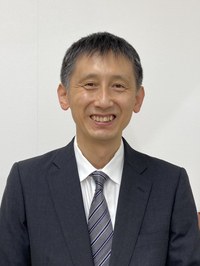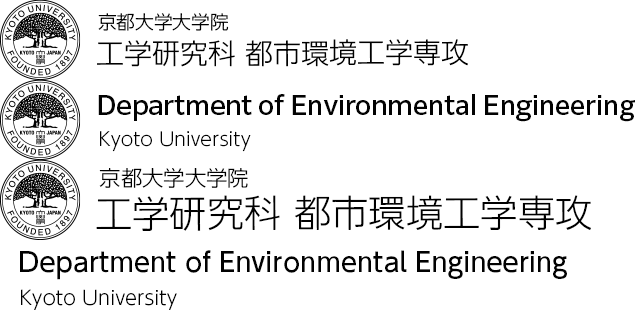Water Quality Engineering
Sewerage has played an important role in inundation control, improvement of public health, and water quality conservation. In recent years, in addition to these roles, sewage treatment plants are expected to evolve into a base for regional revitalization and an energy base by recovering resources collected through sewer pipes. In Water Quality Engineering laboratory, sewerage is placed at the center of education and research, and we are engaged in research aimed at creating a healthy water environment and a sustainable society. Based on field surveys, experiments, and computer simulations, we aim to clarify unknown phenomena and establish water treatment technologies considering the basic principles by analyzing reaction mechanisms and discussing mass balances. We would like to directly contribute to the development of science and realization of sustainable society by seamlessly proceeding from basic research to practical application through scale-up.
Academic Staff
Taku FUJIWARA
Professor (Graduate School of Engineering)
Research Topics
- Energy production from wastewater treatment processes
- Mitigating greenhouse gas emissions from wastewater treatment processes
- Innovative water management system with decentralized water reclamation and cascading material-cycle for agricultural areas
Contacts
Room 222 Bldg. C1-2, C cluster, Katsura Campus
TEL: +81-75-383-3348
FAX: +81-75-383-3351
E-mail:fujiwara.taku.3v![]() kyoto-u.ac.jp
kyoto-u.ac.jp
Taira HIDAKA
Associate Professor (Graduate School of Engineering)
Research Topics
- Biological waste and wastewater treatment
- Anaerobic digestion and biomass
utilization - Water quality management in enclosed water body
Contacts
Room 223 Bldg. C1-2, C cluster, Katsura Campus
TEL: +81-75-383-3350
FAX: +81-75-383-3351
E-mail: hidaka.taira.4e![]() kyoto-u.ac.jp
kyoto-u.ac.jp
Youhei NOMURA
Assistant Professor (Graduate School of Engineering)
Research Topics
- Development of technology for removing trace organic contaminants from wastewater by physicochemical treatment
Contacts
Room 221 Bldg. C1-2, C cluster, Katsura Campus
TEL: +81-75-383-3349
FAX: +81-75-383-3351
E-mail: nomura.yohei.3r![]() kyoto-u.ac.jp
kyoto-u.ac.jp
Research Topics
Development of a novel sewerage system realizing carbon netrality and value creation
In order to transform the sewage treatment plant into an energy supply base, we aim to build a new concept sewage treatment system that creates value by thoroughly using the resources of sewage. Forward osmosis (FO) treatment combined with high-efficiency solid-liquid separation process simultaneously achieve organic matter concentration and sewage treatment, and the concentrated sewage is converted into energy by methane fermentation. With regard to methane fermentation, we also work on the development of technology to convert hydrogen derived from renewable energy into methane, which will contribute to the conversion of conventional sewage treatment plants into energy bases. We aim to realize a sewage system that contributes to carbon neutrality through a series of researches such as elucidating the mechanism of greenhouse gas emission from conventional sewage treatment plants and developing the countermeasure technologies. Furthermore, we are developing a technology for culturing macroalgae using effluent from sewage treatment process to create added value, such as the production of rare chemicals using polysaccharides accumulated in the macroalgae.

Construction of a system for regional material cycle through cooperation of wastewater treatment facility and agriculture
Water, energy, and food are essential resources for human, and it is necessary to develop a system for regional material cycle that considers their mutual relationship. The cooperation of sewage treatment facility and agriculture in small and medium-sized cities is important from the perspective of water, energy, and food nexus, and we aim to create value through a system for cascading material cycle that considers the qualities of wastewater and waste. In addition, we will develop a small-scale wastewater treatment/methane fermentation technique that combine lactic acid fermentation, photosynthetic bacteria, and algae culture to optimize the biomass utilization based on methane fermentation and to improve the value of fertilizer of fermentation residues. In addition, we will study a system that uses the heat and carbon dioxide produced by methane fermentation in the horticulture house, and consider the appropriate placement of wastewater treatment plant and horticulture house from the viewpoint of regional value creation.

Cascading material cycle system 1,2)
1) Japan Science and Technology Agency (2016) Strategic Basic Research Program CREST, Research Area "Innovative technologies and systems to realize sustainable water use", Adopted Research Project in 2009: Development of an innovative water management with decentralized water reclamation and cascading material-cycle for agricultural areas under the consideration of climate change (Research Director: Taku Fujiwara), 1-8.
2) Taku Fujiwara (2016) Development of an Innovative Water Management System with Decentralized Water Reclamation and Cascading Material-Cycle for Agricultural Areas, Journal of the Japan Society on Water Environment, Vol. 39 (A) No. 9, 328-332.
Elucidation of physico-chemical wastewater treatment mechanism and technology development
The existence of chemical compounds has been pointed out in the effluent from wastewater treatment plant, and there are concerns about their adverse effects on human health and the aquatic ecosystem, despite the extremely low concentration. Some of them cannot be removed by conventional treatment processes that utilize biological reactions, and physico-chemical treatment techniques using ultraviolet, ozone, photocatalysts, and adsorbents are expected. We are studying by approaching from both empirical and theoretical analysis for the optimal design and operation of the physico-cheimcal treatment techniques. In particular, we aim to find an optimum balance that achieves the removal of target compounds and the mitigation of transformation byproduct accumulation, clarify the competitive reaction mechanism and the treatment performance of coexsiting substances, and develope an energy saving advanced oxidation technology. We are also working on the development of an advanced oxidation treatment contactor equipped with titanium dioxide/high silica zeolite composite sheet.

Rotating advanced oxidation contactor
Water pollution mechanisms
Many kinds of pollutants including hazardous substances, which are discharged to environment along with human activity, are transported, transformed and concentrated through food chain and ecosystem in water bodies, and then having adverse effect on the ecosystem seriously. Fate of micro pollutants and elements in ecosystem is investigated.
